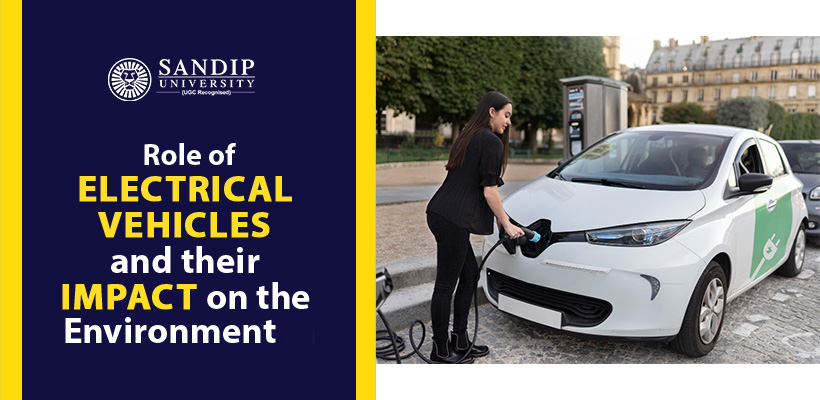Electric vehicles are quickly making a massive impact on the automobile industry and the environment at present. There is a lion’s share of resources being dedicated towards research and development of efficient and environmentally-friendly electric vehicles all around the world. Top automobile companies are now moving towards the designing and manufacturing of electric vehicles as customer demand arises in the market.
There are many advantages of electric vehicles that simply cannot be ignored by those who want to safeguard the environment. Many top electric engineering colleges in Maharashtra are offering cutting-edge programs and training in electric vehicles to help supply qualified professionals to this field. Let us take a look at how electric vehicles fare in comparison to traditional automobiles, the future of electric vehicles, their impact on the environment, and the advantages and disadvantages of electric vehicles in the long run.
Electric Vehicles: Better or Worse than Petrol and Diesel Vehicles?
For customers who are looking for a more environmentally-friendly option in automobiles, an electric vehicle is the right choice. There are many sustainable benefits of electric vehicles which make them the obvious choice for conscious customers. Electric vehicles have an advantage over petrol and diesel cars as they do not rely on burning fossil fuel to function.
The drive system in electric vehicles reportedly experience about 15% to 20% loss of energy when compared to petrol and diesel cars who experience 64% to 75% loss of energy. Electric vehicles have very limited carbon emissions which makes them a more conscious and environmentally sustainable choice towards safeguarding our planet.
Benefits of Electric Vehicles on the Environment
Currently, the transportation industry around the world is heavily dependent on fossil fuels like petrol and diesel to function. These fuels are highly toxic to the environment due to their carbon emissions. Climate change, air pollution, and environmental degradation have become a stark reality only bound to grow worse in coming years if the issue is not tackled head-on.
Electric vehicles provide a better alternative to traditional automobiles. They facilitate the use of renewable sources of energy and reduce the depletion of non-renewable sources of energy. Greenhouse gases are drastically reduced, leading to a greener planet. These advantages have caused governments and companies around the world to heavily invest in the development and promotion of electric vehicles. There is a bright future for professionals who want to make a career in electric vehicles over the next few decades.
Advantages of Electric Vehicles
There are many benefits of electric vehicles with a positive impact on the environment, including:
- No Tailpipe Emissions: Electric vehicles do not emit any tailpipe emissions compared to their traditional counterparts, making them carbon-free and a sustainable choice.
- Control Depletion of Resources: Since electric vehicles do not use fossil fuels, they help in the conservation of non-renewable resources to facilitate proper use of these limited resources.
- Minimal Use of Harmful Oils: Electric vehicles do not need motor oils or lubricants for their engine to function which drastically reduces the use of such toxic oils.
- Noise Pollution Control: Electric vehicles do not have a high combustion engine so they create much less noise when running, making them very beneficial in controlling noise pollution.
- Environmentally-sustainable Batteries: Latest research has made leaps and bounds in creating batteries that minimise carbon footprint, making electric vehicles environmentally-friendly.
- Cheaper Maintenance: Spare parts, especially brake pads, are designed differently so they are more durable and do not corrode easily, cutting down on maintenance costs of electric vehicles.
- No Need for Traditional Gas Stations: Electric vehicles do not need to be fuelled at traditional petrol or diesel stations. Users can recharge the battery of the vehicle in their residential complex as well.
Disadvantages of Electric Vehicles
- Some Dependency on Fossil Fuel: Most developing and even some developed nations depend on fossil fuels like coal to generate electricity, so ultimately charging electric vehicles can lead to additional dependency on fossil fuel.
- Impact of Battery Manufacturing: The process of manufacturing the batteries used in electric vehicles can negatively impact the environment, erode a location’s biodiversity, and cause a shortage of natural resources.
- Mineral Mining Issues: Minerals like lithium, cobalt, etc. are used in batteries of electric vehicles, which are mined in countries which have a poor record of environmental safety. Such activities can actively contribute to the degradation of the environment.
- Initial Stages of Research: The research and development undertaken to design and manufacture electric vehicles and its batteries is still in its early stages, and currently there is very little scope to recycle materials used to create electric vehicles and its batteries.
- Short Lifespan of Electric Vehicles Parts: Components in electric vehicles like tyres and batteries have a short life span and need to be replaced faster than traditional automobiles. The batteries are especially costly and so can pose a huge financial burden on the owners of electric vehicles.
Conclusion
These are the various features of electric vehicles and their impact on the environment in the future. Many top electrical engineering colleges in Nashik offer an M.Tech in Electrical Vehicles program to interested candidates who want to build a career in this field. This program is the perfect balance between theoretical knowledge and research-based practical training to promote better standards in the electric vehicle industry. This program is especially relevant to candidates who have a background in electrical engineering. Do some research and look for colleges offering this program if you are serious about pursuing a career in electric vehicles. Good luck.

